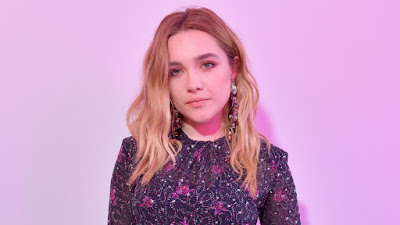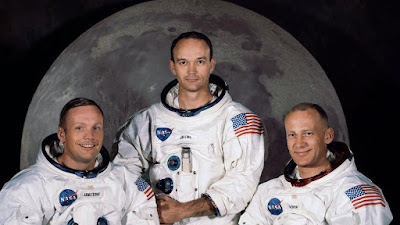2019 has displayed many incredible performances on-screen, as well as highlights from several signature filmmakers, breakout stars, and some amazing career comebacks. Here's a look back at some of them.
WRITER'S NOTE: Most of these selections are based on films I've seen or was able to see this year, and the performers and filmmakers I believe stood out in cinema this year.
PERFORMANCES
Awkwafina (The Farewell), as a young Chinese-born American woman who returns home to visit her terminally-ill grandmother. The rapper-comedian (born Nora Lum) broke out last year in Ocean's 8 and Crazy Rich Asians, and displays a radical level of drama and heart in Lulu Wang's incredible, beautiful film.
Christian Bale (Ford v Ferrari), as real-life British race-car driver Ken Miles, who helped revolutionize the Ford Motor industry at the 24 Hours of Le Mans in France in 1966. The always-committed Welsh actor shed the weight he gained for last year's Vice (as former U.S. Vice President Dick Cheney) and the results, along with his incredible acting chops, is nothing short of brilliant.
Daniel Craig (Knives Out), as a private detective who investigates the death of a wealthy author and holds all his immediate family and staff as possible suspects. The current James Bond first showed off his comedic chops in Steven Soderberg's 2017 heist caper Logan Lucky (and with an equally humorous Southern drawl).
Chris Evans (Avengers: Endgame, Knives Out), who showed off his charisma and determination as Captain America/Steve Rogers one last time in Marvel's blockbuster hit, while displaying a flipside of that persona as a cocky relative later in the year in Rian Johnson's clever and subversive murder-mystery. (You'll never think of Evans the same way again.)
Tom Hanks (A Beautiful Day in the Neighborhood), as the beloved children's television host, Fred Rogers, who makes a positive impact on a cynical journalist. (The equally-beloved actor also did a brilliant job voicing Woody, reportedly one last time, in Pixar's terrific sequel Toy Story 4.)
Zachary Levi (Shazam!), as a 14-year-old foster teenager in an adult superhero's body, with hysterical and surprisingly poignant results. Think Big-meets-Superman, in an 80s-inspired DC Comics flick.
Lupita Nyong'o (Us), as a traumatized young woman who comes face-to-face with a terrifying, red-jumpsuited, scissor-wielding doppelganger in Jordan Peele's brilliant and provocative sophomoric horror film. The Kenyan-Mexican actress (who first won an Oscar for 2013's 12 Years a Slave, and later joined the Star Wars and Black Panther franchises) has become a new face in the genre, joining the ranks of former scream queens Jamie Lee Curtis and Heather Langenkamp. You'll never think of her the same way again as well.
Joaquin Phoenix (Joker), as the iconic DC supervillain in a dark and gritty version of Gotham City in the early 1980s, eerie laugh and makeup and all. While many critics and audiences were divisive on the film (and understandably so), many agree that Phoenix's performance is nothing short of phenomenal as it is chilling.
Matthias Schoenaerts (The Mustang), as an incarcerated convict who's given a shot at redemption through a rehabilitation program for training wild mustangs. Known previously for being the romantic lead in films opposite Marion Cottiard, Kate Winslet, and Carey Mulligan, this Belgian actor is fully-committed, hulking, intense, and tender.
Zhao Shuzhen (The Farewell), as a Chinese family matriarch whose recent cancer diagnoses is kept hidden from her, while her family creates an excuse to get everybody together to see her one last time. The spirit and love of this character is, nevertheless, kept in tact, especially in her relationship with her granddaughter Billie (played by Awkwafina). This is the most genuine, heartfelt relationship I've seen on screen this year.
Renee Zellweger (Judy), as Hollywood star Judy Garland during her tours in London during the final days of her life. A heartbreaking but mesmerizing performance from a wonderful actress who hasn't gotten so much acclaim in over fifteen years. "You had me at hello."
FILMMAKERS
Jon Favreau (The Lion King)
Although it wasn't a great or worthwhile movie, the technical and visual aspect of 2019's version of The Lion King was nothing short of astounding, thanks in part to the techniques applied by director Jon Favreau, who pushed the envelope a few notches from his 2016 adaptation of The Jungle Book (an adaptation that was actually impressive). Favreau also had time to reprise his iconic role as Happy Hogan in the MCU's blockbuster hits, Avengers: Endgame and Spider-Man: Far From Home.
Alma Har'el (Honey Boy)
Israeli documentary filmmaker Alma Har'el displayed confidence and commitment, along with writer-star (and friend) Shia LaBeouf, for the latter's semi-autobiographical drama Honey Boy. Alternating between memories of a child star's relationship with an abusive father and said star as an older man in rehab, Ha'rel maintained a level of intensity and intimacy in the story of a young man coming to grips with his father and with his mental illness. An difficult yet incredible achievement.
Rian Johnson (Knives Out)
After getting a lot of heat for writing and directing the 2017 Star Wars film, The Last Jedi, Rian Johnson surprised people with the clever and subversive murder-mystery, Knives Out, in the style of a modern-day Agatha Christie novel. He also got an impressive cast to boot, including Craig and Evans (mentioned above), Don Johnson, Jamie Lee Curtis, Toni Collette, Michael Shannon, Christopher Plummer, and a breakout Ana de Armas (whom we'll mention in a bit).
Bong Joon-ho (Parasite)
South Korean director Bong Joon-ho (2014's Snowpiercer, 2017's Okja) made history early this year when his film Parasite won the coveted Palme d'Or (the equivalent of a Best Picture win) at the Cannes Film Festival. This dark and unconventional tragicomedy about class and social clashes (between a group of "haves" and "have-nots") features a story and expertly-crafted filmmaking that goes in completely unpredictable and even shocking directions. This is a film for people who love films, and has my vote as the most subversive and edge-of-your-seat film of the year.
Known primarily for broad raunchy comedies (the Hangover trilogy, anyone?), director and co-writer Todd Phillips (along with co-screenwriter Scott Silver and star Joaquin Phoenix) crafted a challenging and controversial take on Batman's iconic supervillain, with themes involving societal breakdowns, lack of empathy, mental illness, and violence. Joker also became the first R-rated film to gross over $1 billion at the worldwide box-office, even though critics were heavily divided on it. And that's no joke.
Anthony & Joe Russo (Avengers: Endgame)
The sibling duo that arguably changed the course of the Marvel Cinematic Universe in more ways than one (e.g., 2014's Captain America: The Winter Soldier, 2016's Captain America: Civil War, 2018's Avengers: Infinity War, 2019's Avengers: Endgame). The Russo's have proven their skill at subverting audiences expectations about Marvel's various characters and storylines, and they pulled it off in spectacular fashion in the penultimate, three-hour epic that wraps up the first three phases of the MCU. "Avengers assemble."
Martin Scorsese (The Irishman)
The three-and-a-half-hour crime epic that is The Irishman is many things. Particularly, it's Scorsese's first film with actor Robert DeNiro in almost 25 years, and it's amazing he was able to assemble a top-notch roster of actors in the same film (DeNiro, Al Pacino, and Joe Pesci have received some of the best reviews and accolades in their careers) and get backing from Netflix, despite being in production limbo for more than a decade. The acclaimed filmmaker (who's been in the industry since the late 1960s) also made headlines this year with controversial remarks he made about Marvel films not qualifying as "cinema." Nevertheless, Scorsese shows he's still at the top of his game and a master of his craft.
Tarantino's love letter to late-1960s Hollywood and the sudden transitions of the era (set against the sudden impact of the Manson family murders and what alternatively--or, fictitiously--could have been) is an intriguing achievement. The famed cinephile also brought out exceptional performances from Leonardo DiCaprio (as a fading T.V. star), Brad Pitt (as a stuntman), and Margot Robbie (as actress Sharon Tate), while his trademark writing and directing style remains as sharp, witty, shocking, and profane as ever.
Taika Waititi (Jojo Rabbit)
This New Zealand-native made a name for himself over the last decade with offbeat films centered on unlikely underdogs overcoming unique obstacles, from 2007's Eagle vs Shark to 2016's Hunt for the Wilderpeople. His latest is an incredibly daring and hysterical comedy-drama, based on the book "Caging Skies" by Christine Leunens, about a young German Nazi-wannabe who discovers his mother is hiding a Jewish girl in their home. Waititi walks a dangerous tightrope with this "anti-hate" story that satirizes Nazi Germany in the 1940s--even with a buffoonish take on Hitler, played by the director himself. The result, however, works, balancing hysterical comedy and moving pathos, and following in the footsteps of such filmmakers as Mel Brooks, Roberto Benigni, and Wes Anderson.
Lulu Wang (The Farewell)
The Farewell is only Wang's second feature film as a director (following 2014's Posthumous, starring Brit Marling), but it's by far her most personal. Based on her own Chinese family and experiences growing up, Wang crafted a thoroughly incredible and complex, often melancholy, story of a family that keeps the matriarch's terminal diagnosis a secret from her and brings the immediate relatives together one last time. I look forward to seeing more work from this terrific filmmaker.
BREAKOUTS
Ana de Armas (Knives Out), as a Cuban housemaid and one of the prime suspects (but central heart) in Rian Johnson's acclaimed murder-mystery. De Armas's previous credits include 2016's War Dogs and 2017's Blade Runner 2049.
Jimmie Fails (The Last Black Man in San Francisco), as a Bay Area resident who works to take back his grandfather's house in his childhood neighborhood. Fails co-wrote the screenplay with first-time director (and childhood friend) Joe Talbot, and both won the "U.S. Dramatic Special Jury Award" at Sundance back in January.
Zack Gottsagen (The Peanut Butter Falcon), as a young man with Down Syndrome who runs away from his group home to pursue his dream of being a professional wrestler. Gottsagen (who has DS in real-life) inspired writer-directors Tyler Nilson and Michael Schwartz to make a film centered around him, and the result is one of the most authentic and genuine portrayals of a character with a disability seen in quite a long time. It's also an adventurous and heartwarming story, as Gottsagen shows real connections with co-stars Shia LaBeouf (who claimed the actor helped him through a difficult period in his life) and Dakota Johnson (who plays his caretaker).
Paul Walter Hauser (Richard Jewell), as the real-life hero (and later prime suspect) of the 1996 Atlanta bombings. Hauser's previous credits include episodes of FX's It's Always Sunny in Philadephia and a scene-stealing turn in 2017's biographic I, Tonya. For director Clint Eastwood, Hauser displays a level of quirkiness, determination, and eventual growth as Jewell goes up against the media and the investigators who wrongfully convicted him. A provocative and gripping story and performance.
Noah Jupe (Honey Boy)
This young British actor has worked previously with directors George Clooney (2017's Suburbicon), Stephen Chbosky (2017's Wonder), and John Krasinski (2018's A Quiet Place). But it was his performance in Alma Ha'rel's semi-autobiographical Honey Boy (as a young version of writer/co-star Shia LaBeouf) where he really broke out. He also nabbed a supporting role as Christian Bale's son in James Mangold's Ford v Ferrari.
Florence Pugh (Fighting With My Family, Little Women, Midsommer)
This up-and-coming British actress has made a name for herself in dark period roles on TV and film. In 2019, she had no less than three films released: Stephen Merchant's WWE biopic Fighting With My Family, Ari Aster's repulsive horror feature Midsommar, and Greta Gerwig's wonderful adaptation of Little Women.
"The Scoops Troop" (Stranger Things, Season 3)
I know this one's kind of a cheat, but I'm mentioning it anyway. While this season of the acclaimed Netflix series wasn't without its faults--and there were many, to be sure--there's no question this quartet of characters (including newcomer Robyn, played by Maya Hawke, pictured second-left) singlehandedly stole the entire season in their mission to crack a secret Russian code and discover a cover-up that connects to the neon-blazen Starcourt Mall in the fictitious Hawkins, Indiana in Back to the Future-set 1985.
Naomi Scott (Aladdin, Charlie's Angels)
This multi-talented English actress first garnered attention as Kimberly the Pink Ranger in 2017's Power Rangers. This year, she not only got to take up the mantle of Princess Jasmine in Guy Ritchie's live-action version of Aladdin, but also became part of the secret agent trio (along with a surprisingly comedic Kristen Stewart and newcomer Ella Balinska) in Charlie's Angels.
CAREER COMEBACKS
Shia LaBeouf
The former child actor has gained a reputation over the years for troubling behavior, before an arrest and year on probation and court-ordered rehab in 2017. It was this latter "low point" that persuaded him to recount his trauma in what would become the screenplay for his semi-autobiographical Honey Boy (even portraying his own father in the film). Since the film's acclaimed premiere at Sundance earlier this year, LaBeouf has been on better terms and a more humble mindset than ever before. My hats off to him.
Eddie Murphy
The comedy icon made a triumphant return to the SNL stage in December, hosting for the first time in 35 years. Reprising iconic characters as Mister Robinson, Gumby, and Buckwheat, Murphy also gained acclaim this year for his performance as real-life actor Rudy Ray Moore in the Netflix comedy-drama Dolemite Is My Name. He also announced a return to stand-up, as well as upcoming sequels to Coming to America and Beverly Hills Cop.
One of the most celebrated leading men in film, Pitt made headlines in the last couple of years with his divorce from actress Angelina Jolie, as well as AA meetings for for reported alcoholism. In his first film roles in almost two years, Pitt showed he still has charisma and confidence, as stuntman Cliff Booth in Quentin Tarantino's 60s homage Once Upon a Time . . . In Hollywood, and as astronaut Roy McBride in James Gray's sci-fi adventure Ad Astra. He even had an "Actors on Actors" conversation this fall with none other than Adam Sandler. Never thought I'd live to see that.
Keanu Reeves
Keanu Reeves seems to be everywhere this year, from social media to reprising his role as assassin John Wick in a third installment (titled Parabellum), to voicing a Canadian daredevil action figure in Toy Story 4 (stroke of genius), and even popping up in the Netflix romantic comedy Always Be My Maybe. He'll also be reprising one of his most famous roles in a third Bill & Ted movie next year. "Whoa."
Adam Sandler
For nearly the last four years, the "Sandman" has been partnering with Netflix for his Happy Madison productions, most of which garnered negative reception. Besides a critical turn in Noah Baumbach's 2017 feature The Meyerowitz Stories (New and Selected), Sandler appeared in his first theatrical release in four years, headlining the Safdie Brothers' dark, hard-R thriller Uncut Gems, and garnering some of the best reviews and accolades of his career (including "Best Actor" from the National Board of Review). He also released his first stand-up special in years, the original but raunchy 100% Fresh (which did feature a touching tribute to the late Chris Farley), and hosted SNL for the first time (complete with a hilarious "Sandler Family Reunion".)
The former "Fresh Prince" garnered some heavy box-office this year in "Big Willie Style," with Disney's live-action take on Aladdin this past summer. While nobody can ever truly top the genius of Robin Williams from the 1992 animated classic, Smith indelibly makes the role his own and is entertaining to watch. And while Ang Lee's Gemini Man (released in the fall) wasn't a financial hit (despite many praising the de-aging visual effects applied to make Smith appear 20 years younger), he did retain his comedic charm in Blue Sky animation's December release of Spies in Disguise, and will be reuniting with Martin Lawrence for a third Bad Boys movie this January.
AND FINALLY, A CAREER LANDMARK
Some of our most memorable movie moments have been set against the moon. From George Melies' rocket landing on the rock's eye-socket, to E.T. and Elliott soaring across the sky on their bike, the moon also represents one of our nation's greatest journeys and accomplishments when astronauts Neil Armstrong, Buzz Aldrin, and Michael Collins flew there on the Apollo 11 mission in 1969. As last year's feature film First Man did, this year's compelling documentary Apollo 11 chronicles the journey these men took in "one small step for man, [and] one giant leap for mankind."


























































